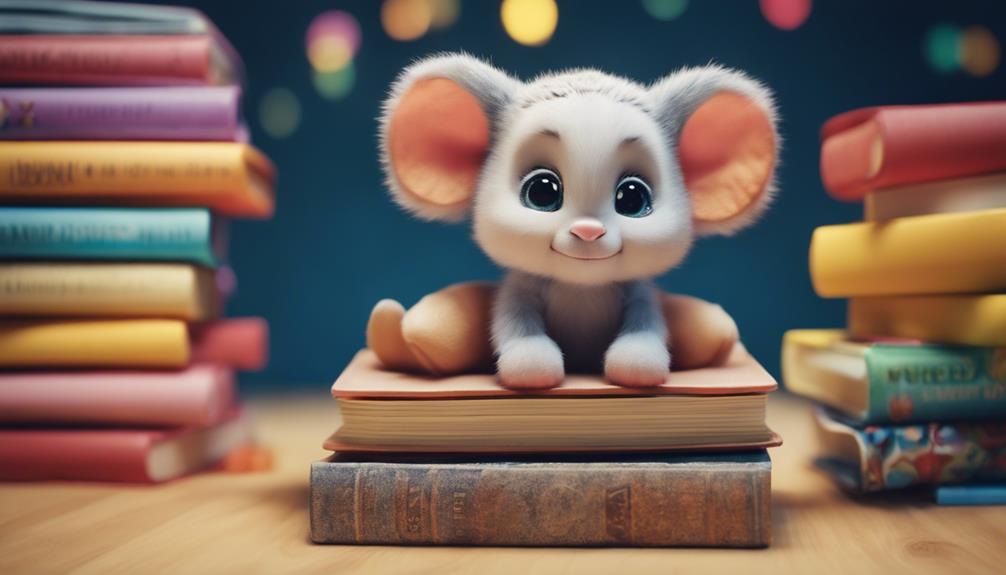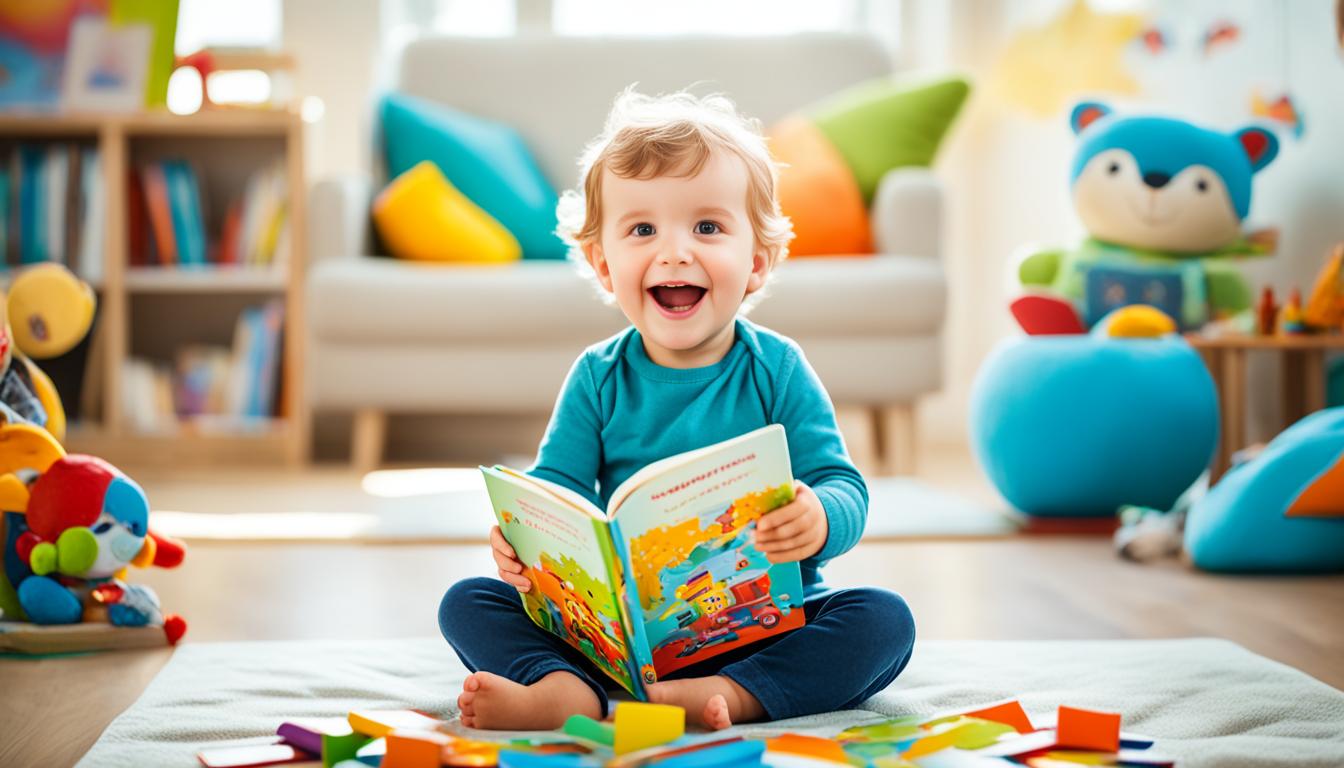When monitoring your baby’s language milestones, pay attention to their progression in recognizing sounds like ‘ma’ and ‘na’ from birth to 2 months. In the following months, observe their ability to connect sounds like ‘m’ and ‘b’ with specific lip movements. As they reach 4 to 6 months, track the diversity in their babbling, incorporating various sounds like ‘oo’ and ‘ee.’ Around 6 to 9 months, notice intentional sound repetition, indicating a growing language awareness. By 12 months, watch for their first words and gestures as they begin to communicate. These milestones provide insight into your baby’s developing language skills.
Key Takeaways
- Recognizing sounds like 'ma' and 'na' in the first 2 months is crucial for language development.
- Babbling diverse sounds like 'ma,' 'na,' and 'oo' between 4-6 months signifies language progress.
- Intentional sound repetition, like saying 'mama' or 'dada,' at 6-9 months shows language awareness.
- First words and gestures around 9-12 months mark the beginning of verbal communication.
- Vocabulary expansion to 50 words by 12-18 months includes simple questions and descriptive words.
Recognizing Sounds: Birth to 2 Months
During the first two months of your baby's life, they're capable of distinguishing sounds like 'ma' and 'na.' Your baby's ability to recognize these sounds is an important milestone in their language development.
Around this time, babies also start associating sounds with lip movements, laying the foundation for future speech. By paying attention to these early responses, you can better understand your baby's communication cues.
These early interactions with sounds and lip movements are vital for your baby's language acquisition later on.
As your baby grows, their ability to distinguish and mimic sounds will continue to develop. Encouraging these early vocalizations by responding positively can help support their language skills.
Lip Movements and Sounds: 2 to 4 Months

Around 2 months old, your baby's ability to associate sounds with specific lip movements begins to develop, laying the foundation for future speech and language skills. As infants progress from 2 to 4 months, they become more adept at connecting the movements of their lips with the sounds they produce. By 4 weeks of age, babies can already differentiate between syllables like 'ma' and 'na,' showing an early sensitivity to speech sounds. This period marks a pivotal stage in your baby's language development, as they start to link specific sounds such as 'm,' 'w,' 'p,' and 'b' with the corresponding lip movements. This foundational skill sets the stage for the emergence of more complex speech patterns in the coming months. Below is a table summarizing key points about lip movements and sounds in infants between 2 to 4 months:
| Developmental Stage | Key Milestones | Age Range |
|---|---|---|
| Lip Movements and Sound Association | Connecting sounds like 'm,' 'w,' 'p,' and 'b' with lip movements | 2-4 months |
| Syllable Differentiation | Distinguishing between syllables like 'ma' and 'na' | Around 4 weeks |
| Emergence of Speech Sound Connections | Linking specific sounds with corresponding lip movements | 2-4 months |
Babbling Variety: 4 to 6 Months
Around 4 to 6 months, your baby's babbling will become more diverse, incorporating sounds like ma, na, oo, and ee. This variety helps your little one explore different vocalizations and lay the groundwork for language development.
Keep an ear out for back-of-the-tongue consonants like g and k, as well as lip sounds such as m, w, p, and b, which are common during this stage.
Vocalization Development
Between 4 to 6 months, babies begin an exciting journey of vocalization development, exploring a variety of babbling sounds. At this stage, your little one starts experimenting with vowel sounds like ma, na, oo, aa, and ee, along with back-of-the-tongue consonants such as g and k, and lip sounds like m, w, p, and b.
By associating these sounds with specific lip movements, your baby is laying the groundwork for future speech development. Babbling not only allows your child to practice forming sounds but also serves as an important step towards progressing into using words later on.
The range of sounds your baby produces during this period showcases their growing vocalization abilities. Encourage and engage with your baby during this stage of vocalization development to support their language skills and foster their communication abilities.
Sound Imitation Skills
As your baby explores the variety of babbling sounds between 4 to 6 months, their sound imitation skills begin to develop, allowing them to mimic and experiment with different sounds they hear.
During this stage, your little one might start imitating sounds they hear around them, such as ma, na, oo, aa, ee, g, k, m, w, p, and b. Here's what to watch for as your baby's sound imitation skills blossom:
- Diverse Babbling Sounds: Your baby will produce a range of sounds, including vowels like aa and consonants like p and b.
- Lip Movements: Pay attention to your baby's lip movements as they try to replicate sounds like m and w.
- Sound Association: Babies at this age start associating sounds with specific lip movements, laying the groundwork for speech development.
- Mimicking Skills: Encourage your baby's efforts to mimic sounds, as this helps them refine their sound imitation abilities and prepare for future language development.
Intentional Sound Repetition: 6 to 9 Months

During the developmental stage of 6 to 9 months, babies begin intentionally repeating sounds like 'mama' or 'dada' as a means of communication. This essential sound repetition is a pivotal step in language development as it signifies the baby's growing awareness of language and their ability to mimic sounds they hear.
As babies experiment with repeating sounds, they may also play with variations in pitch and tone, showing an early understanding of the nuances of communication.
Intentional sound repetition serves as a building block for the baby's first words and gestures. It lays the groundwork for verbal communication by helping babies understand the connection between sounds and meanings.
Parents and caregivers play an important role during this stage by encouraging and positively reinforcing these attempts at communication. By engaging with the baby's sounds and responding enthusiastically, caregivers can support the baby's language development journey and foster their growing ability to communicate effectively.
First Words and Gestures: 9 to 12 Months

Around 9 to 12 months, babies typically begin to utter their first words and use gestures to communicate their needs and desires effectively. This period marks an exciting stage in language development, as your little one starts to express themselves more clearly.
Here's what to expect during this time:
- First Words: By around 12 months, most babies will say their first word, such as 'mama' or 'dada,' as they start to grasp language.
- Gestures: Between 9 to 12 months, gestures like pointing and grunting become common ways for babies to convey what they want or need.
- Combining Sounds: Around 10 months, you may notice your baby starting to combine sounds and even using invented words to communicate.
- Babbling Development: Intentional repetition of sounds like 'gaga' is a positive sign that your baby's babbling is evolving into more word-like sounds.
Encourage and celebrate these early communication milestones as your baby takes their first steps towards mastering language skills.
Vocabulary Expansion: 12 to 18 Months

How does a baby's vocabulary typically expand between 12 to 18 months? During this stage of your child's development, you can expect their vocabulary to grow to around 50 words.
They'll start to use descriptive words like 'big' or 'yummy' and may ask simple questions using single words like 'where' or 'what.' Additionally, children in this age range often begin to request common foods by name, showing an understanding of basic grammar rules and instructions.
At this point, your little one might prefer using nouns over verbs and adjectives. They might enjoy experimenting with one-word questions and asserting themselves by saying 'No.'
This period is significant for language development as your child starts to grasp the fundamentals of communication. Encouraging their efforts and engaging them in conversations can further support their vocabulary expansion and overall language skills.
Simple Sentences Forming: 18 to 24 Months

By 18 to 24 months, your child starts putting together simple sentences, combining words like 'I go' or 'Daddy eat.' Their sentences become longer as they explore adding -ing to verbs and -s to nouns.
You might notice them using pronouns such as 'me' and 'you,' marking a key step in their language development.
Sentence Length Increases
Children between 18 to 24 months start combining words to form simple sentences expressing basic needs and desires. This period marks a significant development in their language skills as they begin to string together words to convey more complex thoughts.
Here are some key points to look out for during this stage:
- Two-Word Sentences: Children will start putting together two words to form basic sentences like 'more milk' or 'play ball'.
- Simple Yes-No Questions: They may begin using simple words to ask questions such as 'go out?' or 'eat now?'.
- Basic Needs and Desires: At this age, kids can communicate their basic needs and desires through short phrases like 'mommy hug' or 'want toy'.
- Increased Sentence Length: Parents and caregivers may notice a growth in the child's ability to express thoughts with longer phrases, showing progress in their language development.
Encouraging and supporting children during this stage can further enhance their language skills and overall communication abilities.
Vocabulary Expansion Begins
Encouraging language development is crucial during this stage, as toddlers at 18 to 24 months of age embark on a journey of vocabulary expansion, forming simple sentences with two to four words. Engage in conversations and read together to support this process. Your child might say phrases like 'play ball' or 'mommy book' to communicate their desires and thoughts.
This period marks the beginning of vocabulary expansion, with toddlers rapidly learning new words to express themselves. It's common for toddlers to make adorable language mistakes as they experiment with constructing sentences. By observing and listening to others, toddlers absorb language effortlessly, contributing to their growing vocabulary.
Engaging in interactive activities and providing a language-rich environment can further enhance your child's language skills. Celebrate their progress as they string together words to convey their needs and feelings, fostering their communication abilities during this exciting stage of development.
Use of Pronouns
Starting around 18 to 24 months, your little one begins to use basic pronouns like 'I,' 'you,' and 'me' in their simple sentences. This marks a significant stage in their language development as they start to grasp the concept of self and others through the use of pronouns.
Here's what to expect during this exciting phase:
- Sign of Understanding: When your baby says 'I,' 'you,' or 'me,' it shows they're beginning to understand relationships and roles in conversations.
- Development of Language Skills: Using pronouns helps children express themselves and communicate more effectively.
- Modeling Correct Usage: Parents and caregivers can support this milestone by using pronouns correctly in everyday interactions.
- Growing Awareness: As your child incorporates pronouns into their speech, it demonstrates their increasing awareness of themselves and others in their environment.
Conversational Skills: 2 to 3 Years

During the ages of 2 to 3 years, young ones make notable strides in their conversational abilities. They start asking more questions, engaging in conversations, and showing a growing curiosity about the world around them. Children in this age group begin to use words to express their thoughts and feelings more clearly, expanding their vocabulary and communication skills. They also improve their eye contact during conversations, indicating an increased focus and social interaction.
At this stage, kids can answer simple questions and follow two-step commands, demonstrating an understanding of language structure and instructions. Their ability to describe objects using descriptive words enhances their communication skills, making their conversations more detailed and engaging.
Frequently Asked Questions
When Should I Be Concerned About My Child's Language Development?
If your child's language development raises concerns, seek help early. Watch for signs like lack of babbling, regression, or difficulty understanding. Early intervention is essential if your child shows delays in communication skills.
When to Worry About Baby's Speech?
If your baby is not meeting speech milestones, don't hesitate. Seek guidance if babbling is absent by 8-9 months, name response is lacking at 9-11 months, gestures are missing by 10-11 months, or if language skills regress. Early intervention matters.
Why Is It Important to Watch for Language Milestones?
It's important to watch for language milestones in babies as early identification can lead to timely support. Recognizing delays allows for interventions that improve long-term outcomes. Monitoring progress helps foster effective communication skills from an early age.
What Is Important for an Infant's Language Development?
For your infant's language development, fostering early communication cues is essential. Engage in eye contact, imitate sounds, and respond to gestures. By understanding these milestones before the first birthday, you lay a strong foundation for future language skills.
Conclusion
As you observe your baby's language milestones, remember to celebrate each new sound and gesture they make.
From the early lip movements to forming simple sentences, every step is a sign of their growing communication skills.
So, next time you hear your little one babbling away, ask yourself: What exciting conversations will we've in the future?
Keep nurturing their language development and enjoy the journey ahead.










